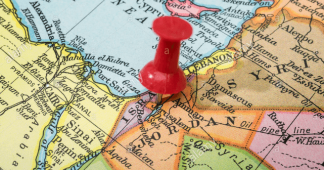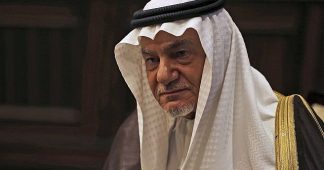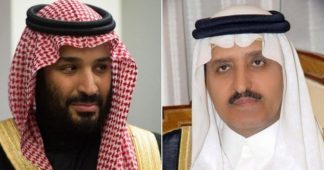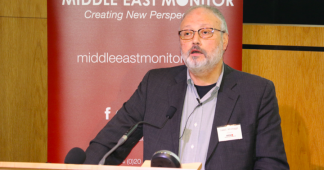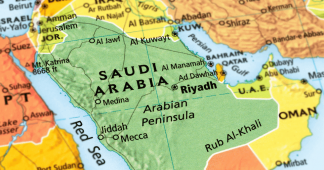Encrypted messages between Bassem Awadallah and Mohammed bin Salman intercepted and deciphered by Jordanian intelligence, sources tell MEE
David Hearst
13 April 2021
Bassem Awadallah, a senior ex-Jordanian official, was arrested over an alleged coup attempt after Jordan’s intelligence services intercepted and deciphered encrypted voice and text messages between him and Saudi Crown Prince Mohammed bin Salman, a source close to the investigation told Middle East Eye.
The two men discussed how and when to use mounting popular unrest in Jordan, stoked by the kingdom’s flagging economy and the Covid-19 pandemic, to destabilise the rule of King Abdullah II.
MEE’s source was not shown the messages himself but was informed of their contents.
Awadallah was among a number of current and former Jordanian officials arrested on and around 3 April as rumours swirled of an alleged coup attempt.
Among those implicated, in what the Jordanian government described as attempts to destabilise the country, was Hamzah bin Hussein, a former crown prince and King Abdullah’s half-brother.
The messages between Awadallah and Mohammed bin Salman were regarded as definitive enough proof of a plot hatched by a foreign power for the Jordanians to share it immediately with their US counterparts. They then reported back to US President Joe Biden.
Based on this intelligence, Biden called King Abdullah before issuing a strong statement of support in the hours after the unrest in Jordan was made public.
Biden then supplemented the statement with his own words. Asked if he was worried about the situation in Jordan, Biden told reporters: “No, I’m not. I just called to tell him that he has a friend in America. Stay strong.”
The Jordanians took this as Biden personally warning Mohammed bin Salman off overthrowing Abdullah.
A second source close to the Royal Court in Amman said the message was also believed to be directed at the crown prince’s strategic partners Benjamin Netanyahu, the Israeli prime minister, and Abu Dhabi Crown Prince Mohammed bin Zayed.
“That message was as much a warning to MBS and his regional supporters MBZ and Netanyahu, who were also involved, as it was a statement of support for Abdullah,” the source said, referring to the Saudi and Emirati crown princes by common nicknames.
The nature of the deciphered intelligence has also been reported separately by a Jordanian journalist who is regarded as the voice of the Royal Court.
Fahd al-Khaitan wrote in al-Ghad newspaper on Saturday: “The intelligence gathered over a period of several months points clearly to a different role played by [Prince Hamzah], who was fully involved in the process of preparing for the zero hour.”
Abdullah meets Mohammed bin Salman
King Abdullah went to significant lengths to stifle the plot quietly without having to confront Prince Hamza or arrest those that were involved.
On 8 March, a week before Jordan was rocked by six Covid patients dying in a hospital in al-Salt that ran out of oxygen, an event that drew Hamzah to the city in a high-profile visit, Abdullah flew to Riyadh with his son Crown Prince Hussein for a personal meeting with Mohammed bin Salman.
Abdullah’s aim was to tell Mohammed bin Salman that he knew what was going on and get his assurance that both he and his son had the Saudi crown prince’s support.
“He was as explicit as he could have been to MBS that he knew what was going on,” a Jordanian source briefed about the visit told MEE.
“He told him destabilising Jordan would not help anyone. He told the crown prince that he wanted to be sure that he supports him and his son.”
Mohammed bin Salman was effusive in response. The Saudi crown prince pledged his personal support to both the Jordanian king and his son.
The source said: “MBS hugged them both. But everyone remembers how he went on his knees to kiss the hand of his cousin Mohammed bin Nayef on the very night he replaced him as crown prince in a humiliating manner.”
When Abdullah saw encrypted messages were still being sent, and when Hamzah turned up at al-Salt decrying the authorities’ failure to provide enough oxygen to the hospital, a visit described as the “straw that broke the camel’s back”, the king realised he had no option but to confront his half-brother and arrest the alleged plotters.
Yusuf al-Huneiti, the head of Jordan’s military, was then sent to Hamzah’s palace to deliver the message that the prince had “crossed a red line” and was under house arrest.
Awadallah remains in detention. Last week, it was reported that Saudi Foreign Minister Faisal bin Farhan flew to Amman to secure the release of Awadallah, who holds Saudi citizenship.
The minister also came with an official letter of support from King Salman to King Abdullah. However, sources told MEE that Abdullah refused to attend the meeting.
Losing support
Following Prince Hamzah’s detention and Awadallah’s arrest, attempts have been made to understand what – if any – connections the two men had.
Sources told MEE that the relationship between Awadallah and Prince Hamzah was long-standing.
Friends of Prince Hamzah have denied this, saying the pair only met while Awadallah received condolences over the death of his brother two months ago.
According to an Arab source who previously considered himself a friend of Awadallah, the Jordanian businessman began passing messages to Hamzah shortly after he definitely split with King Abdullah in November 2018.
Awadallah had been close to Abdullah. He was head of the Royal Court and then finance minister. He was then dismissed, but the close relationship between Awadallah and the king continued.
He was appointed the Jordanian Royal Court’s special envoy to Saudi Arabia, and claimed a part in negotiating the establishment of a Saudi-Jordanian Coordination Council, a vehicle launched in 2016 that Amman hoped would bring in billions of dollars.
The Washington Institute think tank reported at the time: “The fund, said to be part of Saudi Arabia’s recently unveiled ‘Vision 2030’ initiative to decrease the kingdom’s dependence on oil revenues, will reportedly focus its investment in the Aqaba Special Economic Zone.”
However, the money never came.
Marwan Muasher, former Jordanian foreign minister and vice president of Carnegie Institute wrote: “The Saudis have not provided any direct bilateral assistance to Jordan since 2014. A combined Gulf package of $2.5bn from Kuwait, Saudi Arabia, and the UAE after a new wave of protests in Jordan in 2018 largely took the form of loan guarantees and deposits in the Central Bank of Jordan, with little if any direct budget support. Meanwhile, the UAE and Qatar have extended smaller bilateral packages.”
The Jordanian Royal Court considers this watered-down support part of a longtime strategy to strangle the kingdom and destabilise it, sources said.
Two years later, in June 2018, when the king was under pressure from street protests against austerity measures, Abdullah dismissed the then-prime minister Hani al-Mulki.
Awadallah boasted to his Arab friends that he would replace Mulki. He did not, and in November that year he was dismissed as envoy to Riyadh.
“Awadallah began talking very negatively about Abdullah, both in his briefings to MBS and MBZ,” the Arab source told MEE.
“Awadallah was not the only factor, but he became part of the Saudi and UAE agenda to put more pressure on Jordan to completely comply with them.”
Prince Hamzah has denied he was part of a foreign plot.
Speaking in English in the video passed by his lawyer to the BBC, Hamzah said he was not part of any foreign conspiracy and denounced the ruling system as corrupt.
“[Jordanians’] wellbeing has been put second by a ruling system that has decided that its personal interests, financial interests, that its corruption is more important than the lives and dignity and future of the ten million people who live here,” he said.
Authorities in Amman have promised Jordanians a transparent investigation, and their mouthpieces in the official media continue to talk up the seriousness of the alleged sedition.
Khaitan wrote in al-Ghad: “Until the investigation is completed and the bill of indictment is issued against the defendants, with all the profuse confessions included therein, it is then that public opinion will realise the size and seriousness of this case and many people will receive an answer to a question that dominated the public sphere about the soundness of linking the prince to Bassem Awadallah.”
This article is available in French on Middle East Eye French edition.
Published at www.middleeasteye.net
